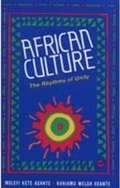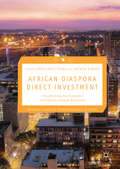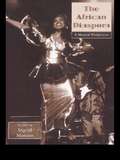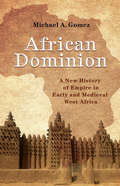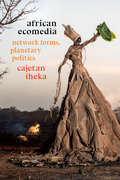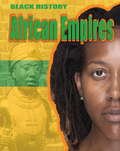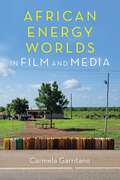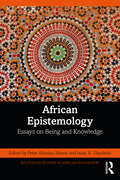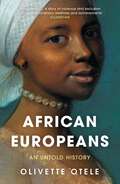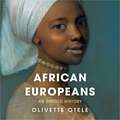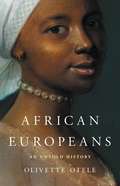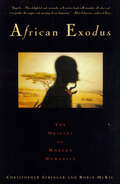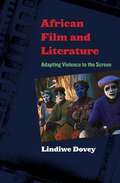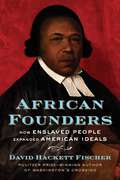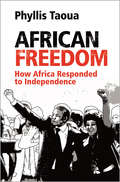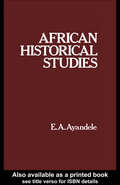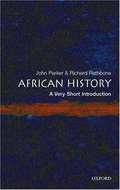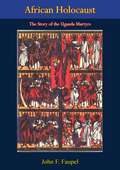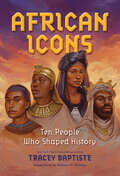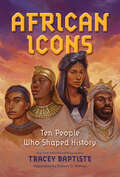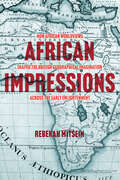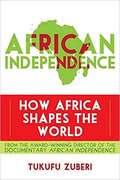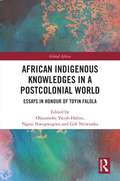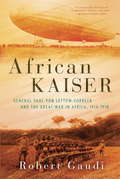- Table View
- List View
African Culture: The Rhythms of Unity
by Molefi Kete Asante Kariamu Welsh AsanteKey voices in the African world discuss differences and similarities in African culture.
African Diaspora Direct Investment: Establishing The Economic And Socio-cultural Rationale (Palgrave Studies Of Entrepreneurship In Africa)
by Dieu Hack-Polay Juliana Siwale<P>Examining the experiences of Africans setting up businesses back home, the main focus of this book is to establish the economic, social and psychological reasons for such ‘home direct investment’. <P>Despite the personal sacrifices that are often needed in order to set up new ventures, the diaspora invests relentless effort and motivations in the pursuit of home ventures. <P>The authors explore critical areas such as the social and psychological pressures that African Diasporas experience when investing in their home countries, as well as the management of diaspora businesses and the impact of such investment to local economies.
African Diaspora: A Musical Perspective (Critical and Cultural Musicology)
by Ingrid MonsonThe African Diaspora presents musical case studies from various regions of the African diaspora, including Africa, the Caribbean, Latin America, and Europe, that engage with broader interdisciplinary discussions about race, gender, politics, nationalism, and music.
African Dominion: A New History of Empire in Early and Medieval West Africa
by Michael A. GomezA groundbreaking history that puts early and medieval West Africa in a global contextPick up almost any book on early and medieval world history and empire, and where do you find West Africa? On the periphery. This pioneering book, the first on this period of the region’s history in a generation, tells a different story. Interweaving political and social history and drawing on a rich array of sources, including Arabic manuscripts, oral histories, and recent archaeological findings, Michael Gomez unveils a new vision of how categories of ethnicity, race, gender, and caste emerged in Africa and in global history more generally. Scholars have long held that such distinctions arose during the colonial period, but Gomez shows they developed much earlier.Focusing on the Savannah and Sahel region, Gomez traces the exchange of ideas and influences with North Africa and the Central Islamic Lands by way of merchants, scholars, and pilgrims. Islam’s growth in West Africa, in tandem with intensifying commerce that included slaves, resulted in a series of political experiments unique to the region, culminating in the rise of empire. A major preoccupation was the question of who could be legally enslaved, which together with other factors led to the construction of new ideas about ethnicity, race, gender, and caste—long before colonialism and the transatlantic slave trade.Telling a radically new story about early Africa in global history, African Dominion is set to be the standard work on the subject for many years to come.
African Ecomedia: Network Forms, Planetary Politics
by Cajetan IhekaIn African Ecomedia, Cajetan Iheka examines the ecological footprint of media in Africa alongside the representation of environmental issues in visual culture. Iheka shows how, through visual media such as film, photography, and sculpture, African artists deliver a unique perspective on the socioecological costs of media production, from mineral and oil extraction to the politics of animal conservation. Among other works, he examines Pieter Hugo's photography of electronic waste recycling in Ghana and Idrissou Mora-Kpai's documentary on the deleterious consequences of uranium mining in Niger. These works highlight not only the exploitation of African workers and the vast scope of environmental degradation but also the resourcefulness and creativity of African media makers. They point to the unsustainability of current practices while acknowledging our planet's finite natural resources. In foregrounding Africa's centrality to the production and disposal of media technology, Iheka shows the important place visual media has in raising awareness of and documenting ecological disaster even as it remains complicit in it.
African Empires (Black History #5)
by Dan Lyndon-CohenThe history of the African continent covers thousands of years, thousands of kilometres and millions of peoples speaking hundreds of languages. There are countless stories, dances, poems and songs. They tell the history of the great ancient civilisations, such as the Egyptians; the powerful kingdoms in West Africa of Mali and Songhai; the trading cities of Timbuktu and Gao; and enormous structures, such as the pyramids and Great Zimbabwe. This book looks at the great civilisations of the African continent and the people within these complex societies.The Black History series brings together a wide range of events and experiences from the past to promote knowledge and understanding of black culture today.
African Energy Worlds in Film and Media (New Directions in National Cinemas)
by Carmela GarritanoCan you imagine a post-petroleum world? African Energy Worlds in Film and Media joins energy humanists committed to undoing our deep dependence on fossil fuels and advancing equitable energy transitions by advancing this vision with a spotlight on African perspectives.African cinema is a rich and varied medium for investigating the entanglements and social embeddedness of energy with global modernity and for imagining a world that leaves fossil fuels behind for unrealized green energy futures. African Energy Worlds in Film and Media shows us how African cinema makes sensible the energetic aspects of life in the ecological mesh that is planet Earth and grounds us in the everyday of the postcolonial, bringing attention to the enduring legacies of racism and colonialism that unevenly distribute energy-related violence and risk and amplifying Africans' demands for access to the energy networks that undergird modernity. With a focus on feature, documentary, and arthouse films, including canonical films by Ousmane Sembène and Djbril Diop Mambety and new work by emergent directors Nelson Makengo and Djo Tunda Wa Munga, author Carmela Garritano examines how these stories depict an array of energy sources from mineral extraction to wind and the by-products of these energy processes, like plastic and electronic waste.Situated at the intersection of film studies, African studies, and energy humanities, African Energy Worlds in Film and Media analyzes the political, social, and economic dimensions of global energy forms and systems as represented in African cinema.
African Epistemology: Essays on Being and Knowledge (Routledge Studies in African Philosophy)
by Isaac E. Ukpokolo Peter Aloysius IkhaneThis book investigates how knowledge is conceived and explored within the African context. Epistemology, or the theory of knowledge, has historically been dominated by the Western approach to the discourse of knowledge. This book however shines a much-needed spotlight on knowledge systems originating within the African continent. Bringing together key voices from across the field of African philosophy, this book explores the nature of knowledge across the continent and how they are rooted in Africans’ ontological sense of being and self. At a time when moves to decolonize curricula are gaining momentum, this book shows how understanding the specific ways of knowing that form part of the every day life of the African, will play an important part in rebalancing studies of philosophy globally. Employing critical, conceptual and rigorous analyses of the nature and essence of knowledge as understood by indigenous African societies, the book ultimately asks what could pass as an African theory of knowledge. This important guide to the connections between knowledge and being, in African philosophical thought, will be an important resource for researchers and students of philosophy and African studies.
African Europeans: An Untold History
by Olivette OteleA Guardian Best Book of 2020 A History Today Book of the Year, 2020Renowned historian Olivette Otele uncovers the untold history of Europeans of African descent, from Saint Maurice who became the leader of a Roman legion and Renaissance scholar Juan Latino, to abolitionist Mary Prince and the activist, scholars and grime artists of the present day. Tracing African European heritage through the vibrant, complex, and often brutal experiences of individuals both ordinary and extraordinary, she sheds new light not only on the past but also on questions very much alive today - about racism, identity, citizenship, power and resilience. African Europeans is a landmark celebration of this integral, vibrantly complex slice of European history, and will redefine the field for years to come.
African Europeans: An Untold History
by Olivette OteleA Guardian Best Book of 2020 A History Today Book of the Year, 2020Renowned historian Olivette Otele uncovers the untold history of Europeans of African descent, from Saint Maurice who became the leader of a Roman legion and Renaissance scholar Juan Latino, to abolitionist Mary Prince and the activist, scholars and grime artists of the present day. Tracing African European heritage through the vibrant, complex, and often brutal experiences of individuals both ordinary and extraordinary, she sheds new light not only on the past but also on questions very much alive today - about racism, identity, citizenship, power and resilience. African Europeans is a landmark celebration of this integral, vibrantly complex slice of European history, and will redefine the field for years to come.(P) 2020 Hodder & Stoughton Limited
African Europeans: An Untold History
by Olivette OteleA dazzling history of Africans in Europe, revealing their unacknowledged role in shaping the continent Conventional wisdom holds that Africans are only a recent presence in Europe. But in African Europeans, renowned historian Olivette Otele debunks this and uncovers a long history of Europeans of African descent. From the third century, when the Egyptian Saint Maurice became the leader of a Roman legion, all the way up to the present, Otele explores encounters between those defined as "Africans" and those called "Europeans." She gives equal attention to the most prominent figures—like Alessandro de Medici, the first duke of Florence thought to have been born to a free African woman in a Roman village—and the untold stories—like the lives of dual-heritage families in Europe's coastal trading towns.African Europeans is a landmark celebration of this integral, vibrantly complex slice of European history, and will redefine the field for years to come.
African Exodus: The Origins of Modern Humanity
by Chris Stringer Robin McKieA Choice Outstanding Academic BookA Library Journal Best Sci-Tech BookA New York Times Notable BookOnce in a generation a book such as African Exodus emerges to transform the way we see ourselves. This landmark book, which argues that our genes betray the secret of a single racial stock shared by all of modern humanity, has set off one of the most bitter debates in contemporary science. "We emerged out of Africa," the authors cont, "less than 100,000 years ago and replaced all other human populations." Employing persuasive fossil and genetic evidence (the proof is in the blood, not just the bones) and an exceptionally readable style, Stringer and McKie challenge long-held beliefs that suggest we evolved separately as different races with genetic roots reaching back two million years.
African Film and Literature: Adapting Violence to the Screen (Film and Culture Series)
by Lindiwe DoveyAnalyzing a range of South African and West African films inspired by African and non-African literature, Lindiwe Dovey identifies a specific trend in contemporary African filmmaking-one in which filmmakers are using the embodied audiovisual medium of film to offer a critique of physical and psychological violence. Against a detailed history of the medium's savage introduction and exploitation by colonial powers in two very different African contexts, Dovey examines the complex ways in which African filmmakers are preserving, mediating, and critiquing their own cultures while seeking a united vision of the future. More than merely representing socio-cultural realities in Africa, these films engage with issues of colonialism and postcolonialism, "updating" both the history and the literature they adapt to address contemporary audiences in Africa and elsewhere. Through this deliberate and radical re-historicization of texts and realities, Dovey argues that African filmmakers have developed a method of filmmaking that is altogether distinct from European and American forms of adaptation.
African Founders: How Enslaved People Expanded American Ideals
by David Hackett FischerIn this sweeping, foundational work, Pulitzer Prize–winning historian David Hackett Fischer draws on extensive research to show how enslaved Africans and their descendants enlarged American ideas of freedom in varying ways in different regions of the early United States.African Founders explores the little-known history of how enslaved people from different regions of Africa interacted with colonists of European origins to create new regional cultures in the colonial United States. The Africans brought with them linguistic skills, novel techniques of animal husbandry and farming, and generations-old ethical principles, among other attributes. This startling history reveals how much our country was shaped by these African influences in its early years, producing a new, distinctly American culture. Drawing on decades of research, some of it in western Africa, Fischer recreates the diverse regional life that shaped the early American republic. He shows that there were varieties of slavery in America and varieties of new American culture, from Puritan New England to Dutch New York, Quaker Pennsylvania, cavalier Virginia, coastal Carolina, and Louisiana and Texas. This landmark work of history will transform our understanding of America&’s origins.
African Freedom: How Africa Responded to Independence
by Phyllis TaouaThe push for independence in African nations was ultimately an incomplete process, with the people often left to wrestle with a partial, imperfect legacy. Rather than settle for liberation in name alone, the people engaged in an ongoing struggle for meaningful freedom. Phyllis Taoua shows how the idea of freedom in Africa today evolved from this complex history. With a pan-African, interdisciplinary approach, she synthesizes the most significant issues into a clear, compelling narrative. Tracing the evolution of a conversation about freedom since the 1960s, she defines three types and shows how they are interdependent. Taoua investigates their importance in key areas of narrative interest: the intimate self, gender identity, the nation, global capital, and the spiritual realm. Allowing us to hear the voices of African artists and activists, this compelling study makes sense of their struggle and the broad importance of the idea of freedom in contemporary African culture.
African Historical Studies
by E. A. AyandeleFirst Published in 1979. Routledge is an imprint of Taylor & Francis, an informa company.
African History through Sources
by Nancy J. JacobsAfrican History through Sources recounts the history of colonial Africa through more than 100 primary sources produced by a variety of actors: ordinary men and women, the educated elite, and colonial officials. Including official documents, as well as interviews, memoirs, lyrics, and photographs, the book balances coverage of the state and economy with attention to daily life, family life, and cultural change. Entries are drawn from all around sub-Saharan Africa, and many have been translated into English for the first time. Introductions to each source and chapter provide context and identify themes. African History through Sources allows readers to analyze change, understand perspectives, and imagine everyday life during an extraordinary time.
African History: A Very Short Introduction
by John Parker Richard RathboneThis Very Short Introduction looks at Africa's past and reflects on the changing ways it has been imagined and represented, both in Africa and beyond. The author illustrates important aspects of Africa's history with a range of fascinating historical examples, drawn from over 5 millennia across this vast continent. The multitude of topics that the reader will learn about in this succinct work include the unity and diversity of African cultures, slavery, religion, colonial conquest, the diaspora, and the importance of history in understanding contemporary Africa. The book examines questions such as: Who invented the idea of "Africa"? How is African history pieced together, given such a lack of documentary evidence? How did Africa interact with the world 1,000 years ago? Africa has been known as 'the cradle of mankind', and its recoverable history stretches back to the Pharaohs. But the idea of studying African history is itself new, and the authors show why it is still contested and controversial. This VSI, the first concise work of its kind, will prove essential reading for anyone interested in the African continent and the diversity of human history.
African Holocaust: The Story of the Uganda Martyrs
by John F. FaupelAfrican Holocaust, which was first published in 1962, tells the extraordinary story of how and why a group of 22 Catholic converts to Christianity in the historical kingdom of Buganda (now part of Uganda) were executed between 31 January 1885 and 27 January 1887. These “Uganda Martyrs” were killed on orders of Mwanga II, the Kabaka (King) of Buganda, at a time of a three-way religious struggle for political influence at the Buganda royal court. The episode also occurred against the backdrop of the “Scramble for Africa”—the invasion, occupation, division, colonization and annexation of African territory by European powers.A fascinating read.
African Icons: Ten People Who Shaped History
by Tracey BaptisteAuthor Tracey Baptiste takes readers on a journey across Africa to meet some of the great leaders and thinkers whose vision built a continent and shaped the world. Black history begins thousands of years ago with the many cultures and people of the African continent. Through portraits of ten heroic figures — from Menes, the first ruler to be called Pharaoh, to Queen Idia, a sixteenth-century power broker, visionary, and diplomat — this rich and thrilling nonfiction text goes back many millennia to introduce readers to the underrepresented stories of Black history and Black excellence. Illustrator Hillary D. Wilson’s brilliant portraits accompany each profile, along with vivid, information-filled landscapes, maps, and graphics for readers to pore over and return to again and again. Key Text Features map maps author's note chapters facts further information further reading headsings historical context historical note foreword illustrations illustrator's notes introduction labels photographs references resources table of contents Correlates to the Common Core State Standards in English Language Arts: CCSS.ELA-LITERACY.RI.5.3 Explain the relationships or interactions between two or more individuals, events, ideas, or concepts in a historical, scientific, or technical text based on specific information in the text. CCSS.ELA-LITERACY.RI.6.3 Analyze in detail how a key individual, event, or idea is introduced, illustrated, and elaborated in a text (e.g., through examples or anecdotes). CCSS.ELA-LITERACY.RI.6.6 Determine an author's point of view or purpose in a text and explain how it is conveyed in the text.
African Icons: Ten People Who Shaped History
by Tracey BaptisteIn this expansive collection of history, meet ten real-life kings, queens, inventors, scholars, and visionaries who lived in Africa thousands of years ago and changed the world. Black history begins thousands of years ago with the many cultures and people of the African continent. Through portraits of ten heroic figures, bestselling author Tracey Baptiste takes readers on an empowering, energetic journey through time to meet some of the great leaders and thinkers whose vision built nations and shaped the course of history: Menes: Creator of Dynasties Merneith: A Queen Erased Imhotep: From Peasant to God Aesop: The Wisest Man in the Ancient World Hannibal Barca: Unparalleled Military Strategist Terence: North African Playwright Amanirenas: Warrior, Diplomat, Queen Tin Hinan: Founder of a City on the Dunes Mansa Musa: The Richest Man of All Time Queen Idia: Kingmaker Illustrator Hillary D. Wilson's brilliant portraits accompany each profile, along with vivid, information-filled landscapes, maps, and graphics for readers to pore over and return to again and again. This rich and thrilling work, which celebrates Black excellence and provides an essential correction to Eurocentric tellings of history, will enthrall readers of all ages. &“In African Icons, Baptiste engages in the hard work of unveiling the myths about the African continent to young readers . . . This is a great beginner&’s guide to pre-colonial Africa.&” —Ibram X. Kendi, National Book Award-winning author of Stamped from the Beginning and How to Be an Antiracist
African Impressions: How African Worldviews Shaped the British Geographical Imagination across the Early Enlightenment
by Rebekah MitseinNineteenth-century European representations of Africa are notorious for depicting the continent with a blank interior. But there was a time when British writers filled Africa with landed empires and contiguous trade routes linked together by a network of rivers. This geographical narrative proliferated in fictional and nonfictional texts alike, and it was born not from fanciful speculation but from British interpretations of what Africans said and showed about themselves and their worlds. Investigations of the representation of Africa in British texts have typically concluded that the continent operated in the British imagination as a completely invented space with no meaningful connection to actual African worlds, or as an inert realm onto which writers projected their expansionist fantasies. With African Impressions, Rebekah Mitsein revises that narrative, demonstrating that African elites successfully projected expressions of their sovereignty, wealth, right to power, geopolitical clout, and religious exceptionalism into Europe long before Europeans entered sub-Saharan Africa. Mitsein considers the ways that African self-representation continued to drive European impressions of the continent across the early Enlightenment, fueling desires to find the sources of West Africa’s gold and the city states along the Niger, to establish a relationship with the Christian kingdom of Prester John, and to discover the source of the Nile. Through an analysis of a range of genres, including travel narratives, geography books, maps, verse, and fiction, Mitsein shows how African strategies of self-representation and European strategies for representing Africa grew increasingly inextricable, as the ideas that Africans presented about themselves and their worlds migrated from contact zones to texts and back again. The geographical narratives that arose from this cycle, which unfolded over hundreds of years, were made to fit expansionist agendas, but they remained rooted in the African worlds and worldviews that shaped them.
African Independence: How Africa Shapes the World
by Tukufu ZuberiAfrican Independence highlights the important role Africa has played in recent history and the significant role it will continue to play in the future of America and the globe. In a world where much of the power and wealth remains concentrated in the hands of a very few people, this book looks at how the history of African independence has touched all people—from refugees to heads of state. <p><p> Author Tukufu Zuberi weaves exclusive interview excerpts and stories from many Africans he has met with old newsreels, current news and reports, and research into a larger narrative that takes readers through key events in African history and shows their importance today. The book provides context for understanding connections between events in Africa and the world, such as Nigeria’s Boko Haram acts of war against the citizens of Nigeria and neighboring states, China’s rise as the main superpower with the largest financial connections to the African continent, and the so-called war against terrorism. <p><p> Zuberi is also the director of the documentary African Independence, which has won awards including Best Director and Best Documentary at the San Diego Black Film Festival, Best Director at The People’s Film Festival, Best African Film at the San Diego Black Film Festival, and more. Both alone and together, the book and film offer a deeper understanding of Africa’s central role in world affairs.
African Indigenous Knowledges in a Postcolonial World: Essays in Honour of Toyin Falola (Global Africa)
by Olajumoke Yacob-Haliso, Ngozi Nwogwugwu and Gift NtiwunkaThis book argues that ancient and modern African indigenous knowledges remain key to Africa’s role in global capital, technological and knowledge development and to addressing her marginality and postcoloniality. The contributors engage the unresolved problematics of the historical and contemporary linkages between African knowledges and the African academy, and between African and global knowledges. The book relies on historical and comparative political analysis to explore the global context for the application of indigenous knowledges for tackling postcolonial challenges of knowledge production, conflict and migration, and women’s rights on the continent in transcontinental African contexts. Asserting the enduring potency of African indigenous knowledges for the transformation of policy, the African academy and the study of Africa in the global academy, this book will be of interest to scholars of African Studies, postcolonial studies and decolonisation and global affairs.
African Kaiser: General Paul von Lettow-Vorbeck and the Great War in Africa, 1914-1918
by Robert GaudiThe incredible true account of General Paul von Lettow-Vorbeck and his exploits in World War I Africa with the legendary "Schutztruppe." As World War I ravaged the European continent, a completely different theater of war was being contested in Africa. And from this very different kind of war, there emerged a very different kind of military leader...At the beginning of the twentieth century, the continent of Africa was a hotbed of international trade, colonialism, and political gamesmanship. So when World War I broke out, the European powers were forced to contend with each other not just in the bloody trenches—but in the treacherous jungle. And it was in that unforgiving land that General Paul von Lettow-Vorbeck would make history.With the now legendary "Schutztruppe" (Defensive Force), von Lettow-Vorbeck and a small cadre of hardened German officers fought alongside their fanatically devoted native African allies as equals, creating the first truly integrated army of the modern ageThe Lion of Africa is the almost-forgotten true account of Wiemar Germany’s military escapades on the dark continent. A story of thousand-mile marches through the harshest landscapes; of German officers riding bicycles into battle through the bush; of battleships hidden in jungle rivers teeming with crocodiles; of improbable Zeppelin voyages; of desperate men living off hippo lard and facing dangers in both man and nature.But mostly it is the story of von Lettow-Vorbeck—the only undefeated German commmander in the field during World War I, and the last to surrender his arms in final defeat.
